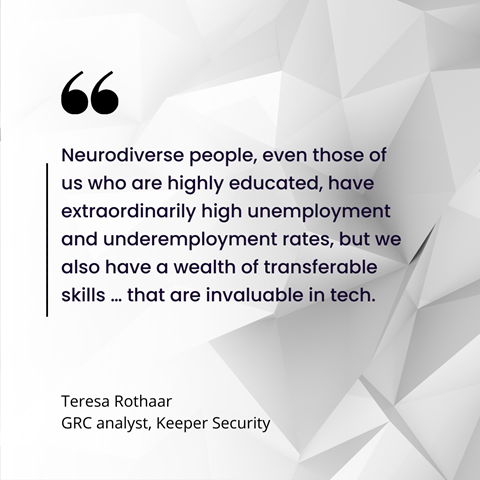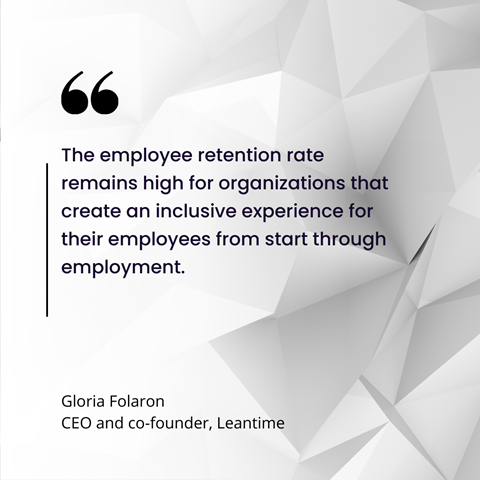Embracing Neurodiversity in IT Workplace to Bridge Talent Gaps
Leveraging the unique skills of neurodiverse individuals can help fill critical talent gaps in the workforce, particularly in IT, by fostering inclusive workplaces that recognize and support diverse cognitive abilities.
September 2, 2024

Nearly half of young adults with autism have never had paid employment, yet there's immense opportunity to fill large talent gaps that exist within the current market amidst labor shortages by recognizing the potential in this untapped talent pool.
Neurodiverse individuals, such as those with autism spectrum disorder (ASD), attention deficit hyperactivity disorder (ADHD), dyslexia, and other neurodevelopmental conditions, often possess exceptional skills in areas such as pattern recognition, attention to detail, logical reasoning, and innovative thinking.
By creating an inclusive workplace culture that recognizes and leverages these strengths, organizations can unlock untapped potential and drive greater innovation and productivity.
As the IT industry continues to prioritize innovation and problem-solving, accommodating neurodiversity in the workforce isn't just a matter of inclusivity — it's a strategic imperative.
To accommodate neurodiversity effectively, organizations must adopt a multifaceted approach. This includes providing tailored support and resources to neurodiverse employees, such as flexible work arrangements, assistive technologies, and specialized training programs.
Additionally, fostering open communication and creating a supportive network of colleagues and mentors can help neurodiverse individuals feel valued and empowered to contribute their unique insights and perspectives.
Supporting Needs, Acknowledging Strengths
IT workplaces can effectively accommodate neurodiverse employees by first acknowledging their strengths and support needs, according to Brigette McInnis-Day, chief people officer at UiPath.
For example, some neurodiverse individuals have better pattern recognition and problem-solving abilities.
"These individuals will bring great value to roles that require analytical thinking and developing novel solutions," she explained.
By matching neurodiverse employees with roles best fit for their abilities, they get the space they need to focus on their strengths and ensure they and their employer thrive.
One organization UiPath works closely with is AutonomyWorks, a nonprofit committed to creating jobs for people with autism that understands how to tap into the strengths and abilities of these adults.
Associates at the company have brought their skillsets to advertising and public relations company Dentsu, where neurodiverse individuals helped label invoices for their document processing workflow.
These team members excelled in artificial intelligence (AI) model testing, data labeling, and exception handling, showing the tangible benefits of neurodiverse talent.
"As AI progresses at unprecedented speed, it is crucial to recognize the distinct cognitive abilities of neurodiverse talent and how they can contribute to training AI models to make them more inventive and efficient," McInnis-Day said.

By matching neurodiverse individuals with tasks that match their skillsets, organizations can get the most out of their entire workforce and provide all employees with opportunities to contribute meaningfully, she said.
Fostering Neurodiversity in the Workplace
The first step, according to Leantime CEO and co-founder Gloria Folaron, is to create a cultural expectation of self-awareness — from leadership to human resources.
"The self-awareness can extend across any biases you might have, relationships, or negative experiences or reactions that exist inside. It's a self-checking mechanism," she said.
The second benefit of this is that, for many neurodivergent individuals, they have not been well-supported in the past — they've been forced to create their own systems to fit into more traditional work environments.
By promoting even employee-level self-awareness, they become empowered to start thinking about their own needs.
"This, in and of itself, can be really liberating and open both strengths and inclusion," said Folaron, who is neurodivergent.
Teresa Rothaar, governance, risk, and compliance analyst at Keeper Security, is also neurodiverse. She said employers should promote the idea that neurodiversity isn't a disability per se, but simply a different way of thinking and perceiving the world.
Employers should also be aware that a neurodiverse applicant's resume and work history may not speak well to their abilities, Rothaar pointed out.
This means hiring parties need to ask the right questions during the interview process to discover the applicant's true potential.
"Neurodiverse people, even those of us who are highly educated, have extraordinarily high unemployment and underemployment rates, but we also have a wealth of transferable skills — things like problem solving, critical thinking, and pattern recognition that are invaluable in tech," she said.
Supportive Environments, Remote Work
IT companies must recognize that not everyone feels comfortable participating or communicating in the same way, McInnis-Day explained.
This means building an environment where neurodiverse individuals feel empowered to contribute in the way that works best for them.
"Allowing employees to share their thoughts and ideas openly, in whatever form that may take, fosters a sense of belonging within the team and encourages participation and engagement," she said.
Individuals should feel encouraged to continuously learn and grow within the team, and continuously hear from their teammates that their development is supported and that they are a valued contributor to the organization's success.
Rothaar added that remote work has been a boon for the neurodiverse community because so many have sensory issues.
"Sounds that may not bother neurotypical people can make it impossible for a neurodiverse person to concentrate," she said. "In an in-person environment, this equates to solutions like dedicated quiet workspaces or noise-canceling headphones."
Neurodiverse people also tend to like structure and do well with lists of concise and specific goals with deadlines, according to Rothaar.
Neurodiversity and DEI
Neurodivergence doesn't know any race or cultural bounds, and it's often invisible as many neurodiverse people have learned to "mask" neurodivergence to fly under the radar, Folaron said.
"In this respect, it needs to be part of the comprehensive plan because if you're only addressing the parts that you can see, you're still missing out on the incredible people who might not otherwise get through the typical hiring process," she said.

For comprehensive inclusivity, employers need to evaluate their processes from their website to their hiring practices, to their interviewing practices, and through the employment journey. Each step in the experience can create failure points across all forms of diversity, equity, and inclusion (DEI).
"The employee retention rate remains high for organizations that create an inclusive experience for their employees from start through employment," Folaron said.
Up to one-fifth of the global population is neurodivergent, so prioritizing this segment of the population is essential to accomplish broader DEI initiatives.
McInnis-Day said to have a truly inclusive environment, workplaces must embrace all the ways a brain can think, which will bring benefits to employers by allowing them to tap into unique problem-solving approaches and skillsets.
This means being intentional about ensuring neurodiverse individuals have a role that fits their individual needs and skillsets, and that they are made to feel supported and respected for their diverse contributions.
"These are some of the same tenets that should apply across all DEI initiatives for an organization," she said.
About the Author
You May Also Like








.jpg?width=700&auto=webp&quality=80&disable=upscale)
